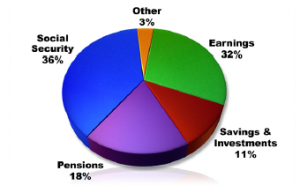Myth: Social Security will provide
|
Myth: Social Security is only a retirement program.Fact: Social Security also offers disability and survivor’s benefits. With all the focus on retirement benefits, it’s easy to overlook the fact that Social Security also offers protection against long-term disability. And when you receive retirement or disability benefits, your family members may be eligible to receive benefits, too. Another valuable source of support for your family is Social Security survivor’s insurance. If you were to die, certain members of your family, including your spouse, children, and dependent parents, may be eligible for monthly survivor’s benefits that can help replace lost income. For specific information about the benefits you and your family members may receive, visit the SSA’s website at www.socialsecurity.gov, or call 800-772-1213 if you have questions. Major Sources of Retirement Income
Note: Data may not total 100% due to rounding. Myth: If you earn money after you retire, you’ll lose your Social SecurityFact:Money you earn after you retire will only affect your Social Security benefit if you’re under full retirement age. |
| Once you reach full retirement age, you can earn as much as you want without affecting your Social Security retirement benefit. But if you’re under full retirement age, any income that you earn may affect the amount of benefit you receive:• If you’re under full retirement age, $1 in benefits will be withheld for every $2 you earn above a certain annual limit. For 2014, that limit is $15,480.• In the year you reach full retirement age, $1 in benefits will be withheld for every $3 you earn above a certain annual limit until the month you reach full retirement age. If you reach full retirement age in 2014, that limit is $41,400.Even if your monthly benefit is reduced in the short term due to your earnings, you’ll receive a higher monthly benefit later. That’s because the SSA recalculates your benefit when you reach full retirement age, and omits the months in which your benefit was reduced.
|
Myth: Social Security benefits are not
Fact:You may have to pay taxes on your Social Security benefits if you have other income. If the only income you had during the year was Social Security income, then your benefit generally isn’t taxable. But if you earned income during the year (either from a job or from self-employment) or had substantial investment income, then you might have to pay federal income tax on a portion of your benefit. What Is Your Full Retirement Age? If you were born in: Your full retirement age is: 1943-1954 66 Note: If you were born on January 1 of any year, refer to the previous year to determine your full retirement |
The opinions voiced in this material are for general information only and are not intended to provide specific advice or recommendations for any individual. To determine which investment(s) may be appropriate for you, consult your financial advisor prior to investing. All performance referenced is historical and is no guarantee of future results. All indices are un-managed and cannot be invested into directly. The information provided is not intended to be a substitute for specific individualized tax planning or legal advice. We suggest that you consult with a qualified tax or legal advisor. LPL Financial Representatives offer access to Trust Services through The Private Trust Company N.A., an affiliate of LPL Financial.

